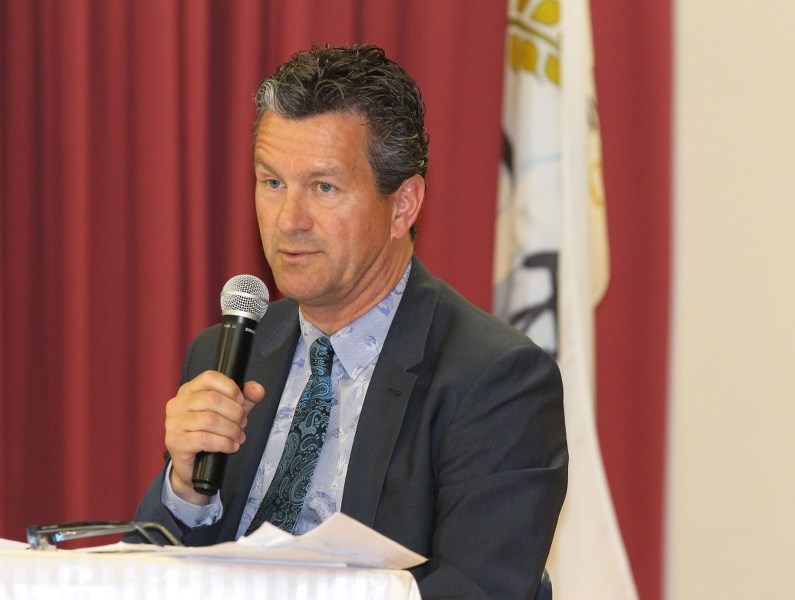With a brand-new sitting provincial government in place and an unfamiliar face representing the region in Legislature, City of Cold Lake Mayor Craig Copeland believes things are going to be very different for Lakeland residents moving forward as Alberta prepares to enter into a new era.
The NDP's, led by Rachel Notley and her ‘Orange Crush' phenomenon, ran away with a landslide majority in the May 5 provincial election, bringing an end to a 44-year Progressive Conservative dynasty in Alberta. Locally, Wildrose candidate Scott Cyr was selected as the man to replace retiring PC MLA Genia Leskiw.
“We're really in unchartered territory right now following the provincial election,” Copeland told the Nouvelle last week. “The NDP will be coming in with some new ideas and new philosophies (as opposed to the PCs) and with Scott coming in as MLA… We've not been on the other side of the fence here (having an opposition MLA) for a long, long time.”
Although the NDPs have yet to release details regarding its plans for the province over the next several years, Copeland admitted he was “very concerned” about the future of the oil industry in Alberta, with Notley previously declaring pipeline development would not be a priority for the left-wing party.
“There are a number of things the NDPs have hinted they will or won't be doing, but one of the (biggest) rumours are the plans (to increase corporate taxes),” Copeland said. “We're hearing they may be looking at a two per cent increase there and my only real question is what is that going to mean for business in Alberta.”
He added, “Right now there's a lot of unemployment in our region and no matter what people may think or say, we are an oil based economy here in the Lakeland. My main concern would be finding out what the NDPs policy is on trying to stimulate the energy sector in Alberta.”
With major oilfield players in the region being forced into a mass slowdown, Copeland said he would be wary of “poking the bear” just yet.
“I don't think people realize the fine line (these companies tread) between making and losing money on the patch and just picking up and going somewhere else,” Copeland said. “I think we need to be very careful when it comes to messing with the goose that lays the golden egg in Alberta. Without the oil industry, where would we be?”
While there have been some rumblings throughout the region that this recent change in government could potentially have an effect on the Cold Lake's ID 349 (Air Weapons Range) deal, Copeland said he wasn't concerned about the NDPs backing out of the agreement.
“The plan moving forward is for ourselves to work alongside municipal affairs to see if we can try and transition the deal from provincial bureaucrats to the City of Cold Lake,” Copeland said. “Everybody here at the City of Cold Lake is really tired of getting beat up over the weapons range deal… The MD of Bonnyville collects (roughly) $60 million in oilfield revenues, yet nobody ever talks about that.”
He added, “This is a deal that was made to ensure the sustainability of Cold Lake. If there are other communities out there with financial issues, they need to have a conversation with municipal affairs, but I don't think taking money away from the City of Cold Lake should be an option.”
With the landscape of provincial politics shifting entirely in one single night, Copeland believes many of Alberta's rural communities are going to be left behind over the coming years, something he hopes will inspire neighbouring communities to work together on a more consistent basis.
“If you were to look at a map of Alberta, if you were to look at where the NDPs strength is, it's the large urban centres,” Copeland said. “You've got your Medicine Hat, Lethbridge, Red Deer, Calgary and Edmonton. Over the next (four years) rural Alberta really isn't going to be at the table. I'm really concerned about the amount of money that is going to be spent in north eastern Alberta.”
With that in mind, Copeland thinks it would be a “smart move” for rural municipalities across the province to “come together” and work with their neighbours.
He added, “That's the future. Our council has always been prepared to have those conversations.”
Copeland though indicated that the City would not be the ones to start the conversation, saying it needed to be something that all parties were on board with.
“It's really going to be up to the other councils to see if they want to come to the table and have conversations. For now, the City of Cold Lake is just going to concentrate on the City of Cold Lake's issues.”



